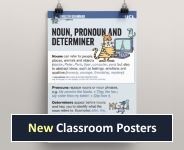Verbs
Verbs have traditionally been described as ‘doing words’ or ‘action words’. This works well for some verbs, like sprint, chatter, eat. Here are some sentence examples with verbs which describe actions:
- I hauled my case from the back seat of the car and lugged it up the steps to the corridor. [W2F-004 #206]
- He played a short pass to Nigel Clough, who with his customary aplomb lifted the ball onto the head of Steve Hodge. [W2C-014 #40]
But what about the verbs in the examples below?
- I feel fine. [S1A-051 #139]
- The land belongs to the state. [S2B-021 #64]
These do not describe actions – nothing is being done. Instead they describe states (the way things are).
In KS1, it is reasonable to approach verbs as 'doing words'. But for older students, a more sophisticated approach is possible. To identify verbs, it is also helpful to look at their form (e.g. their endings) and function (what they do in sentences).
Here are some more examples of verbs in sentences:
- She travels to work by train.
- David sings in the choir.
- We walked five miles to a garage.
- I cooked a meal for the family.
Notice that in (1) and (2), the verbs have an -s ending, while in (3) and (4), they have an -ed ending. These endings are suffixes known as inflections, and they are added to the base form of the verb:
- In (1), for instance, the -s inflection is added to the base form travel. This indicates a present-time situation, and it is in agreement with the third person singular pronoun she.
- In (3), the -ed ending is added to the base form walk: this indicates past time.
Students will notice that only verbs show agreement with a subject, and only verbs can carry tense to express time. No other word classes do those things.
In addition, certain endings are characteristic of the base forms of verbs:
- -ate – concentrate, demonstrate, illustrate
- -ify – clarify, dignify, magnify
- -ise/-ize – baptise, realise, conceptualize
Inflectional endings can be added to these base forms (e.g. concentrates, baptised).
Not all verbs have base forms with special endings. Some have simple forms, like sing, walk, cook.
Sometimes two (or more) verbs occur together:
- David was singing a silly song.
Here singing is the main verb, and was is an extra verb called an auxiliary verb. Auxiliary verbs are a closed class of words, and it is possible to list all of the English auxiliary verbs.
Listen on SoundCloud
Welcome!

Englicious is totally free for everyone to use!
But in exchange, we ask that you register for an account on our site.
If you’ve already registered, you can log in straight away.
Since this is your first visit today, you can see this page by clicking the button below.
- Printer-friendly version
- Log in to view or leave comments

